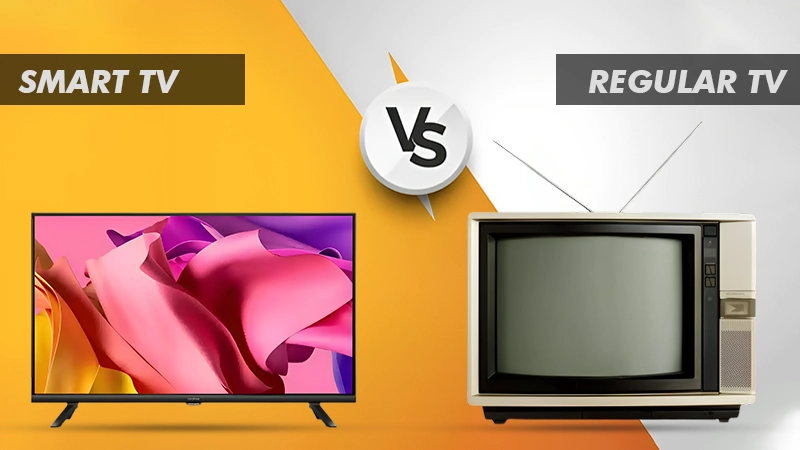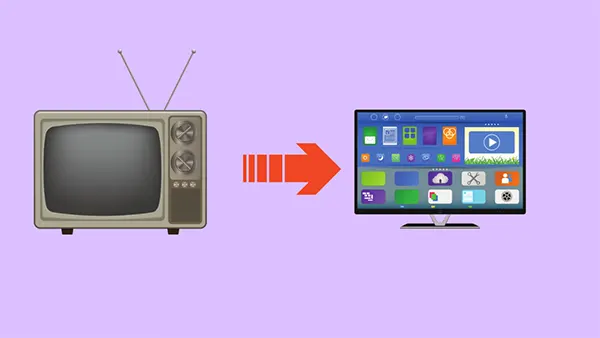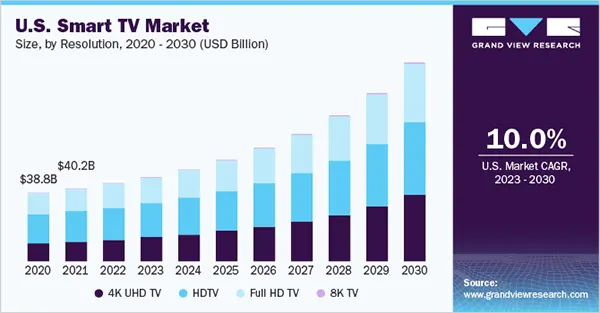Smart TV vs. Regular TV: Which One Is Right for You?

Jump To Key Section
- Understanding Smart TVs
- Exploring Regular TVs
- TV Rentals: A Flexible Option
- Determining Your Needs

Television has evolved significantly in recent years, offering consumers more choices than ever before. So, if you are opting for TV rentals or buying a new one, deciding between a Smart and a Regular TV, it’s vital to consider the needs and preferences.
This guide will explore the differences between these two options and help in determining which one is the right fit for you. So, let’s dive in!
Understanding Smart TVs

(This graph shows the market size of the U.S. smart TVs, by resolution, from 2020 to 2030, in a billion US $).
(Copied from Statista.com)
- The Gateway to Connectivity
Smart TVs are all about connectivity and convenience. These sets are equipped with built-in internet capabilities, allowing you to access a wide range of online stuff and services.
No matter if you want to stream your favorite shows on Netflix, browse YouTube videos, or catch up on the latest news via apps, an automated television has you covered.
- The Streaming Era
They have become synonymous with today’s digital streaming era. They offer easy access to popular digital platforms, making cord-cutting a breeze. As such, a farewell can be bid to traditional cable subscriptions and choose watching services that align with the user’s entertainment preferences.
- The App Ecosystem
One of the significant advantages of them is the vast app ecosystem. You can customize their functionality by downloading apps for everything from streaming to gaming, fitness, and more. The app store continually expands, offering a world of possibilities at your fingertips.
Exploring Regular TVs
- The Tried and True
Regular, non-smart, or traditional sets are the trusted choice that has been a staple in households for decades. They focus solely on displaying broadcast stuff, cable channels, or content from external devices like DVD players and gaming consoles.
- Simplicity and Affordability
They are celebrated for their simplicity and affordability in the highly inflated market. They usually come at a lower price point compared to their automated counterparts, making them an attractive option for budget-conscious consumers.
So, if you’re looking for a straightforward television experience without the bells and whistles, a traditional one may be just what you need.
- External Devices for Content
External devices will be required such as streaming sticks or set-top boxes to access online content and digital services on a regular TV. While this adds an extra step to the process, it allows us to customize the television fixings according to the preferences.
Do You Know?
In this internet era, 96% of people still watch live TV while 80% of them watch online videos every day.
TV Rentals: A Flexible Option
If you’re still undecided between a Smart and a traditional TV, consider their rental options. This flexible option allows us to try out both types before making a long-term commitment. A fully functional set can be taken on rental for a month to explore its features and then switch to a Regular television if it better suits your needs.
As such, renting provides the freedom to experiment and discover which options align with your lifestyle.
Determining Your Needs
- Entertainment Habits
Consider the entertainment habits factor when making the choice. Are you a dedicated streamer who enjoys binge-watching shows on multiple platforms? A Smart TV’s built-in apps and connectivity may be a game-changer.
On the other hand, if you usually stick to old-style cable channels and don’t require internet features, a traditional television may suffice.
- Budget Considerations
The budget is an important factor in the decision-making process as fully functional TVs tend to be more expensive due to their advanced features. If you’re on a tight budget or simply prefer a no-frills watching experience, a Regular set can offer excellent value for the money.
- Room Size and Space
Analyze the size of your room and available space for the television. Smart ones often come in larger sizes with advanced display technology. So, if the space can accommodate a larger television and you value superior image quality, this might be your choice.
Conclusion
In the battle of Smart vs. Regular TV, there’s no one-size-fits-all answer. The choice ultimately depends on the entertainment habits, budget, tech proficiency, and space constraints.
No matter if you opt for the connectivity and convenience of an automated TV or the simplicity and affordability of a traditional one, both options offer a gateway to entertainment in the way. And if you’re still unsure, remember that the rental options can provide a flexible and risk-free way to test both types.
Whichever television is chosen, it’s all about enhancing the viewing experience and enjoying the favorite content with ease and satisfaction. Happy watching!



